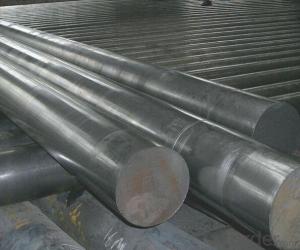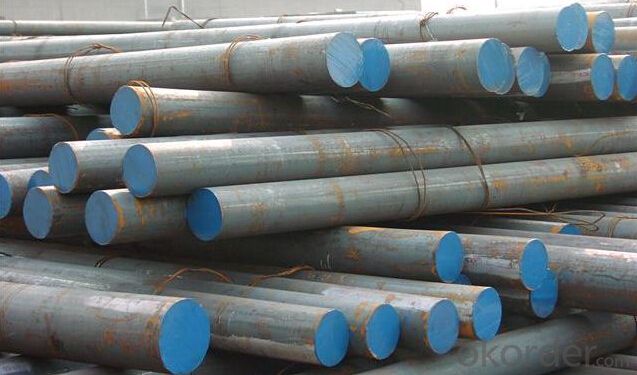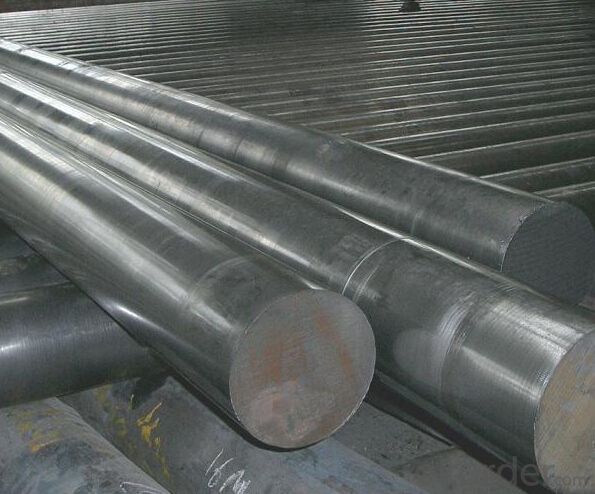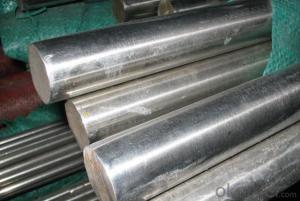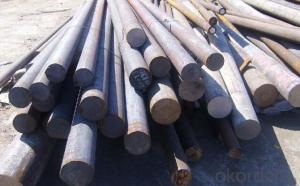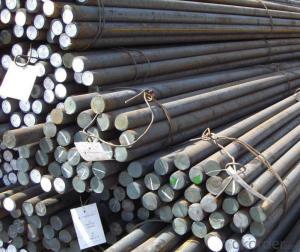Grade 40Mn CNBM Hot Rolled Alloy Steel Round Bar
- Loading Port:
- Shanghai
- Payment Terms:
- TT OR LC
- Min Order Qty:
- 20 m.t.
- Supply Capability:
- 10000 m.t./month
OKorder Service Pledge
OKorder Financial Service
You Might Also Like
Specification
Specifications:
1. Commodity: Round steel bar
2. Technical: Hot rolling
3. Length: Min. 5.8meter, according to requirement.
4.Diameter: 16mm-250mm
Material | 40Mn | Round bar | Dia(mm) | 16-600 |
Process | EAF + LF + VD + Forged + Heat Treatment (optional) | Length (mm) | Max 12000 | |
Heat treatment | Normalized / Annealed / Quenched / tempered | Flat bar | Thickness(mm) | 8-500 |
Delivery condition | Hot forged +Rough machined (black surface after Q/T)+ Turned (optional) | Width(mm) | 70-200 | |
Test | Ultrasonic test according to SEP 1921-84 D/d | Length (mm) | Max 12000 | |
Chemical Composition:
C | Si | Mn | Cr | Ni | Cu |
0.5~0.8 | 0.17~0.37 | 0.25~1.2 | ≤0.25 | ≤0.30 | ≤0.25 |
Usage and Applications:
Gear, Sleevesspool,Shaft, Crankshaft, Pin
Packaging & Delivery:
Packaging Detail: Standard seaworthy packing or as customer required; all goods are packed in bundle with steel strips and shipped by break bulk vessel or container
Delivery Detail: 15~45 days
Production Flow:
EAF+LF+VD+ Forged+ Heat Treatment
Material prepare (billet) — heat up — rough rolling — precision rolling — cooling — packing — storage and transportation
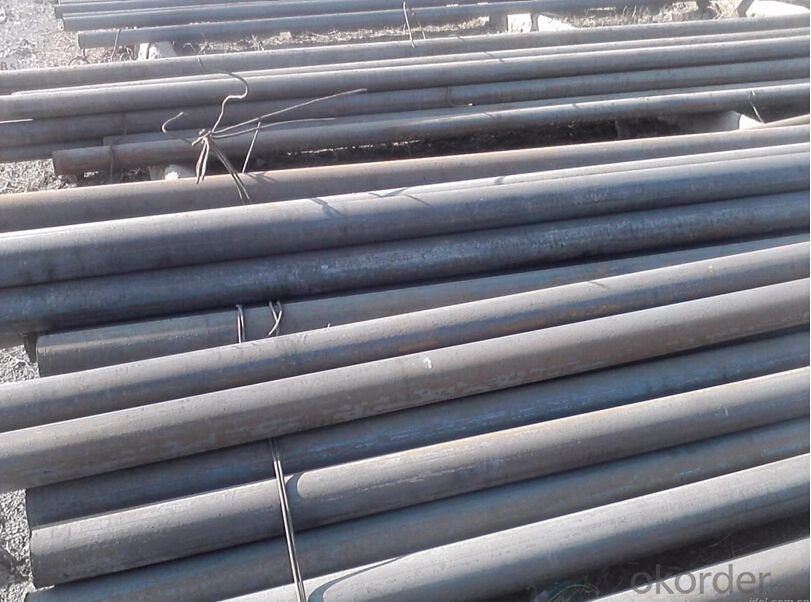
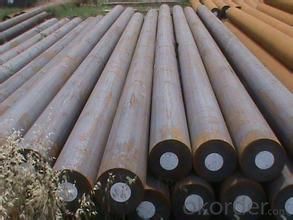
Quality Assurance:
1. We will strictly inspect our production that we sold according to the customer’s request.
2. Our steel reaches international quality standards.
3. Quality should be in conformity with the specification of the manufacturer. Quantity and packing conditions should be in conformity with the term in the contract.
4. Should the packing found damaged, the buyer has the right to claim to the seller
- Q: What are the requirements for special steel used in electronic components?
- The special steel used in electronic components must meet specific and strict requirements. To begin with, it needs to have excellent electrical conductivity in order to effectively transmit electrical signals within the components. This is crucial for the proper functioning and performance of electronic devices. Furthermore, the steel used in electronic components must possess high resistance to corrosion in order to protect the components from environmental factors such as moisture, humidity, and exposure to chemicals. Corrosion can cause the deterioration and failure of electronic components, so the steel must be able to withstand these potential hazards. Another important requirement is that the special steel should have low magnetic permeability. Magnetic interference can have a negative impact on the performance of electronic components, particularly in sensitive devices like microchips. Therefore, the steel used in electronic components should have minimal magnetic properties to avoid any interference with the operation of the components. Moreover, the steel must have good thermal conductivity to efficiently dissipate the heat generated within the electronic components. This is particularly crucial in devices that generate a significant amount of heat, as inadequate thermal conductivity can lead to overheating and potential damage to the components. Lastly, the special steel used in electronic components should have high strength and durability to ensure long-lasting and reliable performance. The components are often subjected to mechanical stress, vibrations, and other external forces, so the steel must have the necessary strength to withstand these conditions without deforming or failing. In conclusion, the requirements for special steel used in electronic components include excellent electrical conductivity, high corrosion resistance, low magnetic permeability, good thermal conductivity, and high strength and durability. Meeting these requirements is crucial for achieving optimal performance and durability of electronic devices.
- Q: What are the different methods of testing the quality of special steel?
- There are several methods used to test the quality of special steel. 1. Chemical Analysis: This method involves analyzing the composition of the steel to ensure it meets the required chemical specifications. It helps determine the presence and quantity of various elements, such as carbon, manganese, chromium, nickel, and others, which are crucial for achieving specific mechanical properties. 2. Mechanical Testing: Mechanical testing is performed to evaluate the strength, hardness, ductility, and other mechanical properties of special steel. Common tests include tensile testing, which measures the steel's resistance to breaking under tension, and hardness testing, which determines its resistance to indentation or scratching. 3. Non-Destructive Testing (NDT): NDT methods are employed to assess the quality of steel without causing damage. Techniques such as ultrasonic testing, magnetic particle testing, and liquid penetrant testing are used to detect surface and internal defects, cracks, or discontinuities that may affect the steel's integrity. 4. Microscopic Examination: Microscopy is used to examine the microstructure of special steel, allowing for the evaluation of grain size, inclusions, and other structural features. This analysis can provide insights into the steel's properties and potential defects. 5. Corrosion Testing: Special steel often needs to resist corrosion in harsh environments. Various corrosion tests, such as salt spray testing, electrochemical methods, and exposure to corrosive substances, are conducted to assess the steel's resistance to corrosion and determine its suitability for specific applications. 6. Impact Testing: This method involves subjecting the steel to a high-energy impact to assess its toughness and resistance to sudden loading. It helps determine if the steel can withstand sudden shocks or impacts without fracturing. 7. Heat Treatment Analysis: Special steel often undergoes heat treatment processes to enhance its properties. Heat treatment analysis involves examining the microstructure and hardness of the steel after the treatment to ensure it has achieved the desired properties. Overall, the combination of these testing methods helps ensure that special steel meets the required quality standards, ensuring its suitability for various applications, such as construction, automotive, aerospace, and industrial equipment.
- Q: What are the different heat treatment methods used for special steel?
- There are several heat treatment methods used for special steel, each with its own purpose and benefits. These methods are employed to enhance the mechanical properties of the steel, such as hardness, toughness, and strength. Some of the commonly used heat treatment methods for special steel include: 1. Annealing: This method involves heating the steel to a specific temperature and holding it at that temperature for a certain period of time, followed by slow cooling. Annealing helps in reducing the internal stress and improving the machinability of the steel. 2. Normalizing: In this process, the steel is heated to a temperature above its critical range and then allowed to cool in still air. Normalizing refines the grain structure of the steel, making it more uniform and improving its strength and toughness. 3. Quenching: Quenching is a rapid cooling process that involves immersing the steel in a quenching medium, such as oil or water, after it has been heated to a specific temperature. This method results in a hardened steel with increased hardness and wear resistance. 4. Tempering: Tempering is a heat treatment process that involves reheating the hardened steel to a specific temperature and then cooling it in still air. This process helps to reduce the brittleness of the steel and improve its toughness and ductility. 5. Austempering: Austempering is a specialized heat treatment method that involves quenching the steel to a temperature just above its martensite transformation range and then holding it at that temperature for a specific time, followed by air cooling. This process produces a steel with a combination of high strength and toughness. 6. Martempering: Martempering is a variation of quenching and tempering, where the steel is quenched and then held at a temperature slightly above its martensite transformation range before air cooling. This method is used to produce a steel with improved toughness and reduced distortion. 7. Nitriding: Nitriding is a surface hardening technique that involves introducing nitrogen into the steel by heating it in an atmosphere of ammonia gas. This process forms a hard nitride layer on the surface of the steel, increasing its hardness, wear resistance, and corrosion resistance. These heat treatment methods are crucial in tailoring the properties of special steel to meet specific requirements in various industries, such as automotive, aerospace, and tool manufacturing. The choice of heat treatment method depends on the desired properties and the intended application of the steel.
- Q: How is precipitation-hardening steel used in the aerospace industry?
- Precipitation-hardening steel, also known as PH steel, is extensively used in the aerospace industry due to its exceptional strength-to-weight ratio and excellent corrosion resistance. This type of steel undergoes a heat treatment process that enables the formation of fine precipitates within its structure, resulting in improved mechanical properties. In aerospace applications, precipitation-hardening steel is commonly utilized for manufacturing critical components such as landing gear, engine parts, and structural elements. Its high strength and durability allow for the construction of lighter and more fuel-efficient aircraft, enhancing overall performance and safety in the aerospace sector.
- Q: What are the specific requirements for special steel used in the chemical reactor industry?
- The special steel used in the chemical reactor industry can have varying specific requirements depending on the application and the chemicals being processed. However, there are generally expected requirements for this type of steel. First and foremost, the steel must possess outstanding resistance to corrosion. Chemical reactors often handle highly corrosive substances, such as acids, alkalis, and reactive chemicals. Hence, the steel must be able to withstand the corrosive effects of these substances to maintain the integrity and durability of the reactor. Secondly, the steel should exhibit resistance to high temperatures. Chemical reactions often require elevated temperatures to facilitate desired transformations. Therefore, the steel used in these reactors must be capable of enduring these high temperatures without compromising its structural integrity or experiencing significant deformation. Furthermore, the steel should possess favorable mechanical properties, including high strength and toughness. The reactor may undergo high pressure and mechanical stress during operation, so the steel needs to be able to withstand these conditions without failure. Additionally, the steel used in chemical reactors should be easily weldable and formable. This allows for convenient fabrication and construction of the reactor, ensuring a reliable and efficient manufacturing process. Moreover, the steel should have low levels of impurities, such as sulfur and phosphorus. These impurities can have adverse effects on the steel's corrosion resistance and mechanical properties. Therefore, the steel must adhere to stringent quality standards to ensure its suitability for use in the chemical reactor industry. In conclusion, the specific requirements for special steel used in the chemical reactor industry encompass excellent corrosion resistance, high temperature resistance, favorable mechanical properties, weldability, formability, and low impurity levels. Meeting these requirements is crucial to guarantee the safety, reliability, and efficiency of chemical reactors in various industrial processes.
- Q: What are the different heat treatment methods for special steel?
- There are several heat treatment methods for special steel, including annealing, quenching, tempering, and normalizing. Annealing involves heating the steel to a specific temperature and then slowly cooling it to improve its machinability and reduce internal stresses. Quenching is a rapid cooling process that makes the steel harder and more brittle, but also increases its strength. Tempering is a heat treatment process that involves reheating quenched steel to a specific temperature and then cooling it again to improve its toughness and reduce brittleness. Normalizing is another heat treatment method that involves heating the steel to a specific temperature and then cooling it in still air to improve its mechanical properties and refine its grain structure.
- Q: What are the applications of tool steel?
- Tool steel has numerous applications in various industries. Some common applications include the manufacturing of cutting tools such as drills, saw blades, and milling cutters. It is also used in the production of dies and punches for metal forming processes. Additionally, tool steel finds applications in the automotive industry for the production of engine components, gears, and shafts. It is also used in the construction industry for manufacturing tools and equipment for cutting, drilling, and shaping materials like wood and concrete. Overall, tool steel is valued for its high hardness, wear resistance, and ability to withstand high temperatures, making it ideal for applications that require durability and precision.
- Q: How is special steel used in the manufacturing of tools and dies?
- Special steel is widely used in the manufacturing of tools and dies due to its exceptional properties that make it suitable for these applications. Special steel, also known as tool steel, is specifically designed to have high hardness, wear resistance, toughness, and heat resistance. In the manufacturing of tools, such as drills, saws, hammers, and chisels, special steel is used to ensure durability and long tool life. The high hardness of special steel allows these tools to withstand the rigors of cutting, drilling, and shaping without easily dulling or deforming. Additionally, the wear resistance of special steel ensures that these tools can maintain their sharp cutting edges for an extended period, reducing the need for frequent sharpening or replacement. Moreover, in the production of dies used in various manufacturing processes, special steel plays a crucial role. Dies are used to shape materials into specific forms or sizes, such as in forging, stamping, or extrusion processes. The high toughness of special steel allows dies to withstand the high pressure and impact forces involved in these processes without cracking or fracturing. Additionally, the heat resistance of special steel ensures that dies can withstand the elevated temperatures generated during these operations without losing their shape or hardness. Special steel also offers excellent machinability, allowing it to be easily shaped and formed into complex tool and die designs. This property is significant in manufacturing, as it enables the production of intricate and precise tools and dies, leading to improved product quality and efficiency. Overall, special steel is an essential material in the manufacturing of tools and dies due to its exceptional hardness, wear resistance, toughness, heat resistance, and machinability. These properties ensure the durability, long tool life, and high performance of tools and dies, contributing to the overall efficiency and quality of various manufacturing processes.
- Q: How is the quality of special steel ensured?
- The quality of special steel is ensured through a combination of rigorous testing, strict quality control measures, and adherence to international standards and specifications. Special steel producers employ various methods such as chemical analysis, mechanical testing, and non-destructive testing to verify the composition, strength, and integrity of the steel. Additionally, special steel manufacturers often have dedicated quality assurance teams that closely monitor the production process to identify any potential issues and ensure the final product meets the required specifications.
- Q: What are the properties of electrical steel?
- Electrical steel, also known as silicon steel, possesses specific properties that make it ideal for use in electrical equipment. It exhibits low core loss, high permeability, and high magnetic saturation, enabling efficient energy conversion and minimizing power losses. Additionally, electrical steel has a high resistivity, reducing eddy currents and further improving its performance in transformers, motors, and generators.
Send your message to us
Grade 40Mn CNBM Hot Rolled Alloy Steel Round Bar
- Loading Port:
- Shanghai
- Payment Terms:
- TT OR LC
- Min Order Qty:
- 20 m.t.
- Supply Capability:
- 10000 m.t./month
OKorder Service Pledge
OKorder Financial Service
Similar products
Hot products
Hot Searches
Related keywords

